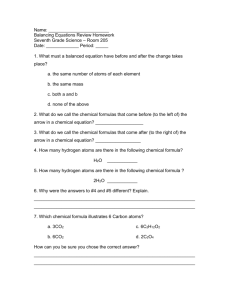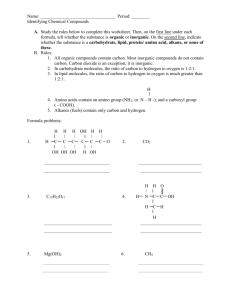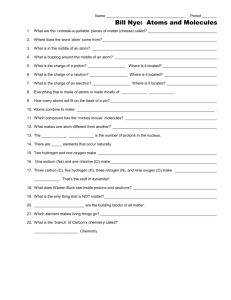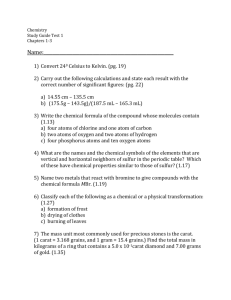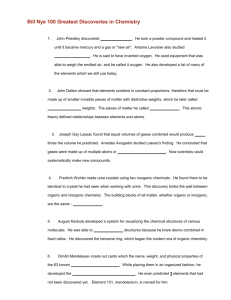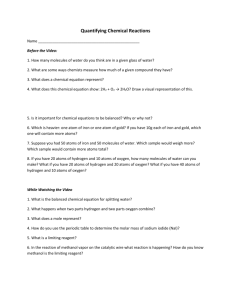CER Example - Science Curriculum
advertisement
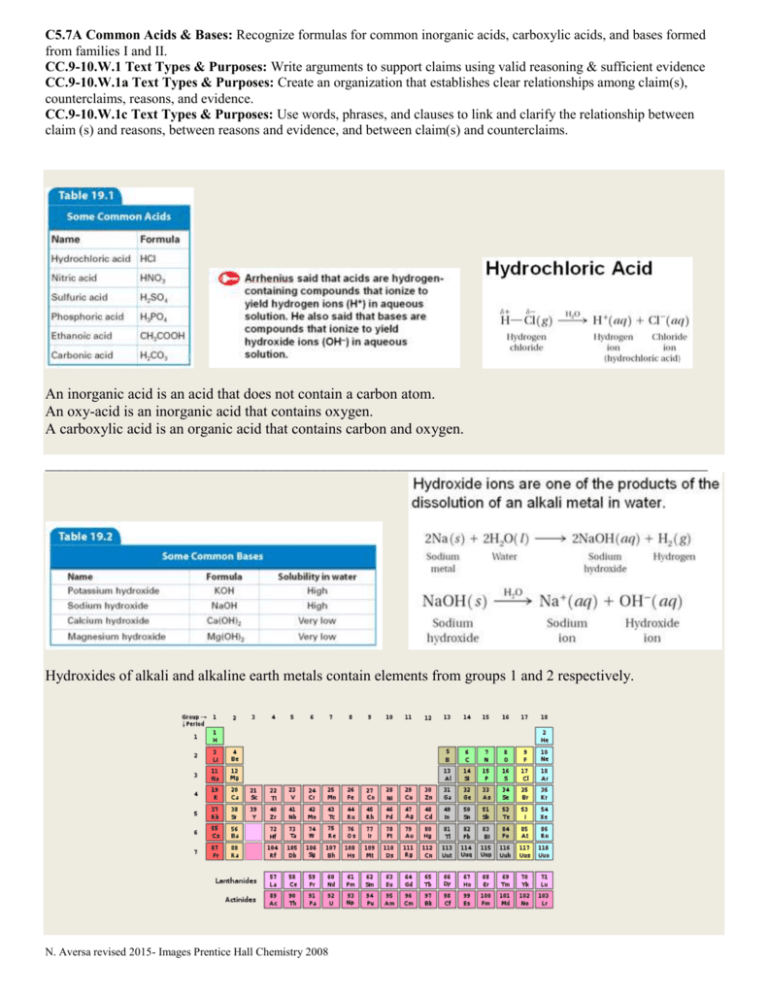
C5.7A Common Acids & Bases: Recognize formulas for common inorganic acids, carboxylic acids, and bases formed from families I and II. CC.9-10.W.1 Text Types & Purposes: Write arguments to support claims using valid reasoning & sufficient evidence CC.9-10.W.1a Text Types & Purposes: Create an organization that establishes clear relationships among claim(s), counterclaims, reasons, and evidence. CC.9-10.W.1c Text Types & Purposes: Use words, phrases, and clauses to link and clarify the relationship between claim (s) and reasons, between reasons and evidence, and between claim(s) and counterclaims. An inorganic acid is an acid that does not contain a carbon atom. An oxy-acid is an inorganic acid that contains oxygen. A carboxylic acid is an organic acid that contains carbon and oxygen. ________________________________________________________________________________________ Hydroxides of alkali and alkaline earth metals contain elements from groups 1 and 2 respectively. N. Aversa revised 2015- Images Prentice Hall Chemistry 2008 Practice Skill: Use the information on the previous page to identify the three types of acids and give a scientific argument for your choices. In addition identify a base and give a scientific argument for your choice. Example: What kind of an acid is phosphoric acid (H3PO4)? A Scientific Argument includes: The Claim (is an answer to a question or a phenomenon) Example: Phosphoric acid (H3PO4) is an inorganic oxy-acid. The Evidence (the evidence supports the claim made based upon data and or observations) 2- 3 pieces of evidence must be presented. Example: it has hydrogen (H) in water it will ionize into a hydrogen ion (H+) it does not contain carbon but does contain oxygen The Reasoning (is the rationale that shows how the evidence supports the claim and why the evidence should count as support, it also should include a rebuttal) Example: Phosphoric acid (H3PO4) is an inorganic oxy-acid. By looking at the formula you can see it contains hydrogen and Arrhenius said that acids are hydrogen containing compounds that will ionize in water releasing hydrogen ions. In this case up to 3 hydrogen ions (H+) can be released. From the formula you can also see that carbon atoms are not present which means it is an inorganic acid. Organic compounds have carbon atoms in them. Also you see that it does contain oxygen atoms making it an oxy-acid. If H3PO4 contained a carbon atom along with oxygen atoms then it would be a carboxylic acid but it does not so it is not a carboxylic acid. I have concluded that phosphoric acid (H3PO4) has 3 ionizing hydrogens, oxygen present, and lacks carbon atoms making it an inorganic oxy-acid. Notice that in the reasoning you will synthesize the claim and evidence into an essay. With the claim and evidence you analyzed. That is to say you broke everything down into smaller parts in order to study them in detail. Let’s take a closer look at the reasoning: 1st sentence is the claim. Phosphoric acid (H3PO4) is an inorganic oxy-acid. 2nd-6th sentences is the evidence placed into complete sentences along with scientific reasoning. By looking at the formula you can see it contains hydrogen and Arrhenius said that acids are hydrogen containing compounds that will ionize in water releasing hydrogen ions. In this case up to 3 hydrogen ions (H+) can be released. From the formula you can also see that carbon atoms are not present which means it is an inorganic acid. Organic compounds have carbon atoms in them. Also you see that it does contain oxygen atoms making it an oxy-acid. 7th sentence is the rebuttal. If H3PO4 contained a carbon atom along with oxygen atoms then it would be a carboxylic acid but it does not so it is not a carboxylic acid. 8th sentence is the restatement of the claim with summary. I have concluded that phosphoric acid (H3PO4) has 3 ionizing hydrogens, oxygen present, and lacks carbon atoms making it an inorganic oxy-acid. N. Aversa revised 2015- Images Prentice Hall Chemistry 2008 Your turn: 1. What kind of an acid is hydrochloric acid (HCl)? The Claim: The Evidence: The Reasoning & Rebuttal: 2. What kind of an acid is sulfuric acid (H2SO4)? The Claim: The Evidence: The Reasoning & Rebuttal: N. Aversa revised 2015- Images Prentice Hall Chemistry 2008 3. What kind of an acid is carbonic acid (H2CO3)? The Claim: The Evidence: The Reasoning & Rebuttal: 4. Is potassium hydroxide (KOH) an acid or a base? The Claim: The Evidence: The Reasoning & Rebuttal: N. Aversa revised 2015- Images Prentice Hall Chemistry 2008

